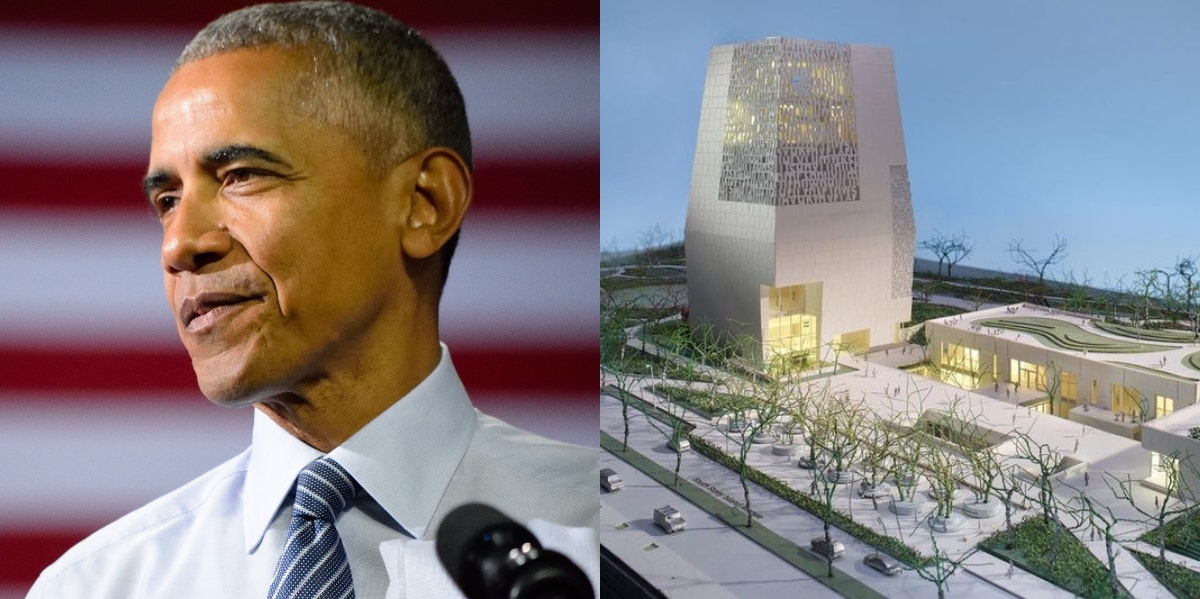Low-Income Black Residents In Chicago Fear Obama's Presidential Center Will Push Them Out Of Their Homes
People are asking Obama to consider their needs.
 Evan El-Amin / Shutterstock / Obama Foundation
Evan El-Amin / Shutterstock / Obama Foundation Construction of the new Obama Presidential Center in Chicago is raising some concerns over whether the development will actually benefit the low-income Black residents in the surrounding neighborhoods.
The center, which has taken five years to break ground, is set to be located in Jackson Park on the South Side of Chicago.
The $500 million project will feature a museum, playground, public library and an open plaza.
Much of the delay in the construction of the center came from lawsuits and a federal review required because of the location of the park, which is on the National Register of Historic Places.
Why South Side residents are concerned about the Obama Presidential Center.
Some of the other concerns came from Black residents living in the area, fearing displacement by the rising rents and land speculation.
Residents are asking for more affordable housing, with many organizers saying the city of Chicago along with the Obama Foundation should set aside jobs for locals, protect the housing market, and support the Black businesses that have already been in the area.
A study conducted at the University of Illinois at Chicago found that housing prices in the area rose between 2010 and 2017.
“While rents vary, there is clear evidence of rising rents in newly renovated and new construction units, which the majority of current renters cannot afford,” the study said.
The Obama Center may push low-income residents out of the area.
Many residents who live near the site of the Presidential Center even held a rally to express their concerns over the project that can essentially drive them out of their communities.
South Side resident Michele Williams voiced her fear of losing her home.
“They are going to displace all of us that they can,” she said in an interview with ABC7 Chicago.
The 79-year-old has lived in Chicago’s South Shore neighborhood, but with the threat of gentrification approaching it means her building near the eventual Obama Presidential Center could be torn down to build more expensive housing.
RELATED: Evanston Becomes The First US City Paying Reparations To Black Residents — Here's How It Will Work
Obama had addressed the concerns in 2017 during a video conference, saying, “I’m not an outsider here. I know the neighborhood. I know that the minute you start saying, ‘Well, we’re thinking about signing something that will determine who’s getting jobs and contracts and this and that.’ Next thing I know, I’ve got 20 organizations coming out of the woodwork, some I’ve never heard of before.”
The area of South Shore is also known to have the highest rate of eviction filings than any other Cook County zip code since the numbers started being tracked in 2011.
The numbers also don’t take into account the other kinds of evictions that researchers call “forced moves” in which the rent prices become too high and residents are forced to find somewhere else to live.
A 2014 American Community Survey found that half of South Shore’s residents live on less than $25,000 per year.
Obama has made comments about why he chose that specific area to be the location of his center, saying that it would become a catalyst for job growth and economic development in the place where he got his start in the world of politics.
He also hoped that the center would turn Chicago’s South Side into a place where people could learn about his presidency as well as any future leaders.
The center’s objective is to be a place for the Black residents in the neighborhood to have a shared community as well as an opportunity to discard the negative reputation of the South Side area.
It also needs to be taken into consideration that this center could potentially be doing more harm than good for the low-income Black residents who are fearful of displacement.
Nia Tipton is a writer living in Brooklyn. She covers pop culture, social justice issues, and trending topics. Follow her on Instagram.
